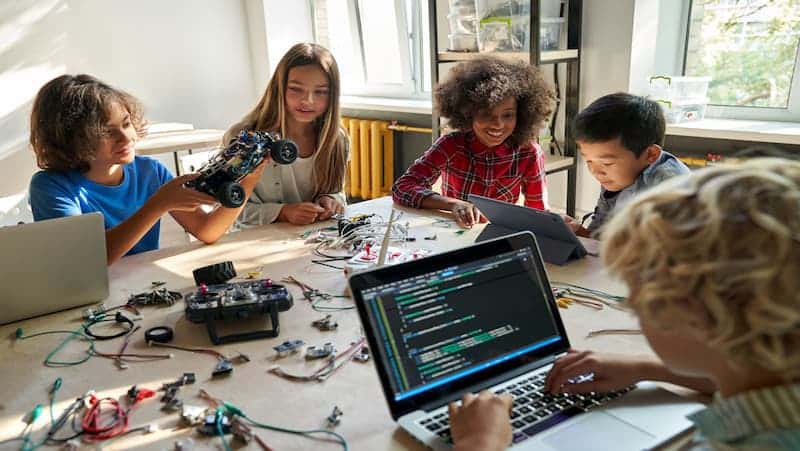

In an era dominated by digital transformation, coding has emerged not just as a skill for IT professionals, but as a fundamental literacy that shapes the way our children understand and interact with the world. Introducing coding into education from an early age isn’t just beneficial; it’s becoming increasingly necessary. Resources like CodaKid offer engaging, age-appropriate learning resources that make coding accessible and fun, helping kids not only to play games but to think like creators who can build their own games, apps, and stories through code.
The Importance of Coding in Modern Education
As technology continues to permeate every aspect of our lives, the educational systems around the globe are recognizing the importance of integrating coding into the curriculum. Not only does coding teach logical thinking and problem-solving, but it also gives students the tools they need to succeed in a rapidly changing world. By incorporating coding, schools are preparing students for a future where digital literacy is as fundamental as reading and writing. Whether it’s automating simple tasks or developing complex algorithms, the ability to code empowers students, enhancing their career prospects in numerous fields beyond technology.
Benefits of Learning to Code at a Young Age
Enhances Problem-Solving Skills
Coding is fundamentally about solving problems and creating solutions. When children learn to code, they are taught to break down complex challenges into smaller, manageable parts and to approach these problems methodically. This type of thinking is transferable to many other disciplines and daily challenges, making them more adept at handling various situations they might encounter in both academic and personal settings. Coding exercises that involve debugging or optimizing code teach resilience and the importance of persistence in overcoming obstacles.
Boosts Creativity
Creativity is at the heart of coding. It’s not just about algorithms and logic; it’s also about envisioning something and bringing it to life through code. By learning to code, children unleash their creativity and learn to express themselves in new ways. Whether they are designing a simple website or creating a complex interactive story, coding allows children to turn abstract ideas into tangible, interactive realities that they can tweak and expand upon as their skills grow.
Prepares for Future Job Markets
In the digital age, coding skills are becoming as essential as literacy and numeracy. With an increasing number of industries relying on software and digital technologies, having coding skills can significantly enhance a child’s job prospects. Furthermore, coding knowledge opens up opportunities in emerging fields such as artificial intelligence, robotics, and data analysis. By learning to code, children are not just prepared to participate in the future job market—they are equipped to lead and innovate within it.
How Coding Integrates with Core School Subjects
Integrating coding into core school subjects can transform traditional education, making learning more engaging and applicable to real-world problems. For instance, coding in mathematics teaches computational thinking, enabling students to visualize complex equations and solve them through programming. In science classes, students can use coding to simulate experiments or analyze scientific data, enhancing their understanding of the subject matter.
Furthermore, coding can enhance language arts by encouraging students to develop interactive stories and games, which require a deep understanding of narrative structure, character development, and user engagement. Even in social studies, coding can be used to create simulations of historical events or to develop models for understanding economic and social patterns.
Mathematics. Develop algorithms to solve mathematical problems, enhancing logical reasoning and precision.Science. Program simulations to visualize scientific concepts, fostering a deeper understanding of theories and principles.Language Arts. Create interactive stories and games that improve writing skills and storytelling techniques.Social Studies. Use coding to model social, economic, and historical scenarios, helping students explore complex systems and relationships.
CodaKid: A Resource for Schools and Parents
For schools and parents eager to integrate coding into children’s education, CodaKid stands out as a prime resource. Offering a range of courses from basic programming to advanced game development and web design, this platform provides educational tools that are both engaging and highly instructive. Using languages and platforms that professional developers rely on, the courses ensure that students acquire practical skills applicable well beyond their schooling.
Educators and parents benefit from a well-structured curriculum that comes with extensive support and resources, facilitating the incorporation of coding lessons into regular educational activities, even for those without a prior background in computer science. Here’s what the platform offers:
Interactive Learning: Engaging, game-like environment that motivates and excites students.Comprehensive Curriculum. Courses designed to grow with students as they advance from basic concepts to complex programming skills.Real-World Tools. Use of professional-grade software that provides students a real insight into the world of software development.
CodaKid not only makes coding accessible but also fun, ensuring that students are not only consumers of technology but also capable creators.





















